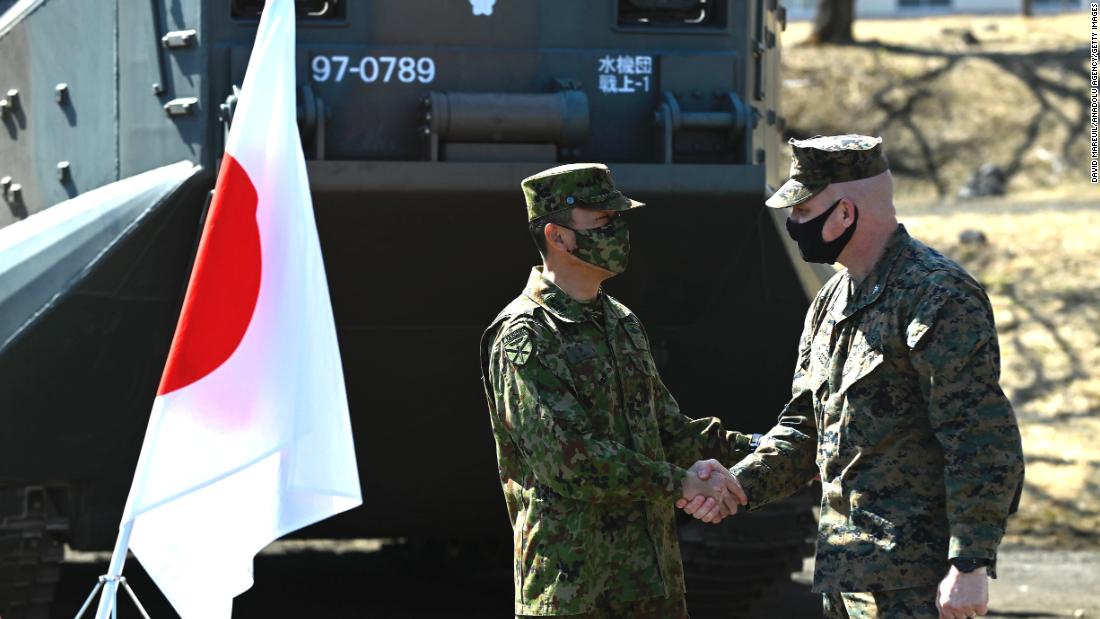The threat is just the latest salvo from Moscow, which has been angered by Japan’s support for Ukraine and its growing ties with NATO nations, and is raising the heat in a long-running dispute over the sovereignty of islands captured by Soviet forces at the end of World War II.
Russian Deputy Foreign Minister Igor Morgulov said on Tuesday that the U.S.-Japan naval drills were “of a potentially offensive nature”, according to a report by Russian news agency RIA-Novosti on Tuesday.
“We view these actions by Japan as a threat to the security of our country,” Morgulov said. “If such practices develop, Russia will take retaliatory measures in the interest of strengthening its defense capabilities.”
However, he did not specify which US-Japan exercises he was talking about – nor did he specify what form Russia’s retaliation might take.
Japan has yet to respond to Morgulov’s remarks and did not respond to a CNN request for comment.
The U.S. and Japanese navies concluded joint exercises in the East China Sea and the Philippine Sea last week, led by the carrier strike group USS Abraham Lincoln.
Earlier this month, the Abraham Lincoln conducted similar joint exercises in the Sea of Japan, on which Russia has a long coastline.
According to the US Navy, the United States and Japan regularly hold joint naval exercises in the Indo-Pacific to “maintain stability in a free and open Indo-Pacific region”.
A lingering World War II dispute
Japan on Friday described four disputed islands as “illegally occupied” by Russia, the first time in two decades that it has used such language.
According to the report, Japan regards the islands as “Japanese territories over which Japan has sovereign rights, but which are currently illegally occupied by Russia.”
While this dispute has been simmering for decades, Japan’s support for Ukraine has increased the pressure in relations between Moscow and Tokyo.
On Tuesday, Japanese Prime Minister Fumio Kishida agreed to provide food and medicine, additional financial support, small drones and protective masks to Ukraine, according to a statement released by the country’s Foreign Ministry.
Earlier this month, Japan expelled eight Russian diplomats and officials over the war in Ukraine.
Japan’s actions ‘predictable and transparent’
Analysts said Moscow was nervous at the moment and was taking out Japan’s frustrations.
“Japan and the United States haven’t done anything out of the ordinary…nothing that really seems to elicit this level of reaction,” said James DJ Brown, associate professor of political science at Temple University in Tokyo.
Drew Thompson, senior fellow at the National University of Singapore’s Lee Kuan Yew School of Public Policy, echoed those thoughts, saying increased military cooperation with the United States was the sensible thing for Tokyo to do.
“Japan is slowly waking up to security threats on its periphery, and it’s doing so in a predictable and transparent way, consistent with a democracy,” Thompson said.
Cmdt. Hayley Sims, spokeswoman for the US 7th Fleet based in Japan, described the joint exercises in the Sea of Japan in early April as “routine bilateral operations”.
“Our training enhances the credibility of conventional deterrence by demonstrating the strength of our bilateral partnerships,” Sims said.
But Russia has a different point of view.
“I think it really shows the heightened nervousness on the Russian side, their tendency to view actions in their vicinity as always potentially offensive,” Brown said.
He said Japan’s increased cooperation with NATO allies, including Britain and France, countries with which Russia has differences in Europe, is heightening tensions in the Pacific.
“One thing the Russians really don’t like is that Japan has been increasing cooperation with other countries beyond the United States in recent years,” Brown said.
Russian provocations
Russia has been flexing its military muscle around Japan over the past few years, analysts said.
Satoru Mori, professor of contemporary international politics at Keio University in Japan, said there had been many Russian provocations in recent months, such as military exercises on disputed islands and tests of cruise missiles launched by submarines in the Sea of Japan.
“Russia has stepped up its military activities near Japan, probably to demonstrate its ability to operate in the Far East, even amid the invasion of Ukraine,” Mori said.
“It’s Japan responding to the momentum that started with the strengthening of Russian-Chinese military cooperation,” Thompson said.
“It is change that is driving Japanese defense planning and political resources, rather than a direct response to these latest Russian threats,” he said. “If anything, this validates Japan’s strategy to bolster its own ability to deter the use of military force against it.”
CNN’s Jorge Engels contributed to this article.

